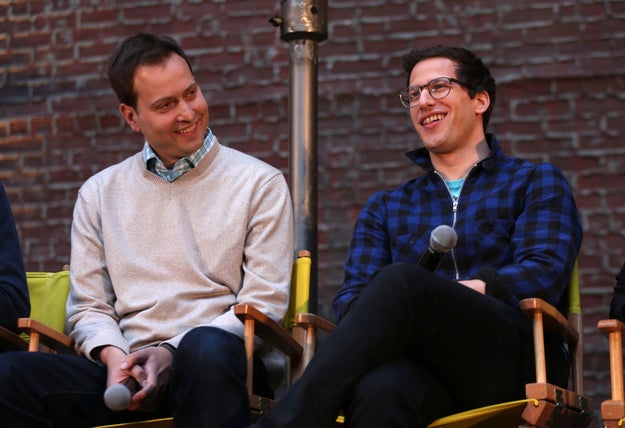
“Our particular squad — our heroes — we’ve always made sure are good cops and model the kind of behavior and techniques that we would hope all cops exhibit,” Dan Goor told BuzzFeed News in an interview this week. The Brooklyn Nine-Nine showrunner knows that his TV show about a gang of lovable cops leans on fantasy. “They’re somewhere between our universe and a slightly idealized version of our universe,” he said.
The police force on Brooklyn Nine-Nine aren’t the kind of you’ve read about in recent headlines about police shootings and use of excessive force towards black Americans. Goofy and golden-hearted, the band of ragtag detectives spend more time pranking each other than they do arresting bad guys, and when they’re out in the field, they can be counted on to serve and protect people equally, with no regard to color — a depiction of the NYPD that, for some, feels more imaginary than real.
Although the comedy show has never presumed itself to be an accurate depiction of how law enforcement actually works, Goor and the writers are tuned in to current events. That’s why Brooklyn Nine-Nine, now in its fourth season, finally tackled the topic of police brutality and systemic racism in the episode that aired this week, “Moo-Moo,” cowritten by Goor and Phil Augusta.
When Sergeant Terry Jeffords (Terry Crews) is rummaging through his neighborhood in search of his daughter’s missing blanket, he’s stopped by Officer Maldack (Desmond Harrington), who is white. Before Terry can explain that he is a police officer, Maldack has already reached for his gun and shouts at him to put his hands on his head. When Terry protests that he hasn’t done anything wrong, Maldack manhandles and frisks him. It’s a sobering moment and a rare instance in which the show directly confronts a very real problem.
Goor says he has wanted to write about police brutality since the show first premiered in 2013, but it wasn’t easy incorporating such a heavy topic into a light-hearted show. “It would almost feel woeful to not talk about this thing that is happening,” he said, considering Brooklyn Nine-Nine features two black officers. “What is our way into the issue, given that we portray our cops as cops who wouldn’t racially profile somebody, or who wouldn’t stop-and-frisk somebody? How do we bring those issues to the fore?” Goor said, rattling off the slew of difficulties he and Jackson encountered.
Jackson told BuzzFeed News that they didn’t want the tone of the episode to come off “too preachy. Another concern was [that it would feel] too much like an afterschool special, where we divert so greatly from the typical tone of the show that it ends up not feeling like the show.”
After they established that the episode would center on racial profiling and stop-and-frisk, they also struggled to establish further conflict. It was Andre Braugher, the actor behind the hilariously deadpan Captain Ray Holt, who provided them with the inspiration. When a distressed Terry tries to file an official complaint against the white cop, Captain Holt, who is also black, cautions him against it for fear of jeopardizing his future prospects in the police force. “The conversation that Dan had with Andre led us to the kind of critical, difficult opinion between Terry and Holt that drove the second half the episode,” Jackson explained.
Dan Goor and Brooklyn Nine-Nine star Andy Samberg in May 2014. Mark Davis / Getty Images
But the crux of the episode occurs when Terry confronts his superior in a moving monologue. “When I got stopped the other day, I wasn’t a cop. I wasn’t a guy who lived in a neighborhood looking for his daughter’s toy,” he tells Holt in the show. “I was a black man, a dangerous black man. That’s all he could see, a threat.”
It wasn’t the writers’ intention to “make a blanket condemnation on the police,” Goor affirmed. “There are a lot of cops who are trying to do the right thing.” But he hopes viewers “take away a sense of how difficult it can be to be a black cop, to be in the middle of being blue and being black,” and now have a better understanding of stop-and-frisk and racial profiling — “and how dehumanizing that can be.”
Jackson echoed his cowriter’s sentiments: “My hope is that people watch the episode, and even if it’s in a small way, [recognize] that racial profiling is a very real thing in this country, that racism is still a very real thing in this country, and that it’s a complex issue that is worth talking about.”


